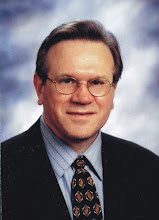I was right. While most of the discussion veered far from health and medicine, some very useful insights came my way. The first thing I noticed was that someone was recording video of the session right in front of me. I thought the fellow looked familiar. When he started speaking on mitigation and destruction of wetlands in the county, I realized it was our own Dr. Becker, a Grady College professor.
Since I could get online using the free wireless system in the Oconee County Civic Center, I started Googling around for background on the wetlands issue. I found a letter Dr. Becker had written recently in the Athens Banner-Herald and also a blog in which he is posting his thoughts and observations about Oconee County in voluminous detail.
Several other people, all sitting on the same side of the room as Dr. Becker, rose in turn to speak in favor of a wetlands resolution that has sat dormant before the Commissioners since last spring. One of the people on this side of the room made a joke about people realizing there was more than one kind of "green" in the county. He (or was it a she--I don't remember now) was referring to the green money that developers seek, while others are more worried about the environmental "green" issues.
When that person stops speaking, the guy moving the microphone from one side of the room said, "OK--now a question from the right." Suddenly, it hit me that he had been saying "question from the right" and "question from the left" all along. All the environmentally green comments, and other generally progressive/liberal comments, were coming from the stage left side of the room. On stage right, the developers and other more conservative people sat.
Oconee County is truly a divided county. It has been unabashedly conservative. In 2004, the county voted to re-elect George W. Bush by a 3:1 margin (73 percent to 27 percent). McCain/Palin attracted 71 percent of the votes in 2008. But a few liberals are living here, and they occasionally make their voices heard.
That is what I learned at this town hall meeting. Oconee County may seem like a wealthy, conservative enclave whose citizens mostly commute to Athens to work. But in many ways, it's just like every other place. It has problems that need to be addressed, people who differ in their outlooks, and issues that can't be swept under the rug by ideologies.
Great background indeed!

